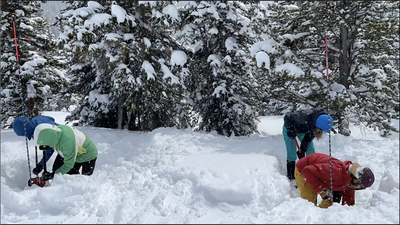
Avalanche Education Course
Avalanche Rescue
This one-day (8-hour) course is intended to be retaken on a regular basis in order to keep abreast of best practices in rescue techniques and gear. New participants will learn companion rescue, and returning students will expand their skills with advanced topics and realistic scenario practice. You should be able to travel off-trail on ungroomed or unmaintained terrain and bring appropriate equipment for traveling on snow, but there are no other prerequisites for this course.
- Sat, Feb 10, 2024
- Committee: Denver
- Members: $118.65
- Availability: 5 (12 capacity)
- Cancellation & Refund Policy
This one-day (8-hour) course is intended to be retaken on a regular basis in order to keep abreast of best practices in rescue techniques and gear. New participants will learn companion rescue, and returning students will expand their skills with advanced topics and realistic scenario practice.
This one-day (8-hour) course is intended to be retaken on a regular basis in order to keep abreast of best practices in rescue techniques and gear. New participants will learn companion rescue, and returning students will expand their skills with advanced topics and realistic scenario practice.
"Getting caught in an avalanche can be violent, gruesome, and heartbreaking. On average, 53% of fully buried victims die (Haegli et al., 2011). The chance of surviving a complete burial decreases significantly after 10 minutes. In North America, the chance of survival in an avalanche is further reduced by the increased incidence of major trauma. In fact, one quarter of avalanche fatalities are due to traumatic injuries, not from asphyxiation (Boyd et al., 2009).
Any time you are in avalanche terrain, the chance of being caught in an avalanche is never zero, even if you are using The AIARE Framework to help your group make good decisions and avoid involvement with an avalanche. Carrying essential rescue gear, knowing how to use it, and regularly practicing using it are essential. Much like wearing a seat belt while in a car. You never plan to get in a car accident on the Interstate, but you’ll wear your seat belt just in case." [Source: avtraining.org]
This course covers:
- Essential rescue equipment: avalanche transceiver, shovel, probe, and a communication device as well as optional equipment to reduce the risk of being buried.
- How to respond if caught in an avalanche yourself.
- Small-team avalanche rescue: the process of rescuing others caught in an avalanche as a team.
- Resources for ongoing avalanche rescue practice.
AIARE Avalanche Rescue is a prerequisite for AIARE 2 and AIARE PRO1. In addition, AIARE recommends that all backcountry travelers keep their skills current by taking an Avalanche Rescue course and receiving a rescue card at least every other year. CMC requires it every 5 years at least to refresh and update skills for CMC leaders and instructors who lead or instruct in avalanche terrain.
LOCATION - Berthoud Pass Or Winter Park in approved private property.
EARLY BIRD REGISTRATION Through January 1, 2024
$118.65 is the discounted price. On January 2, 2024, the price reverts to $125.
After you have registered, please fill out the AIARE Student Profile to maximize your learning experience. Click on the link below.
https://docs.google.com/forms/d/1i5-BI6JbZURbFMqO_7YObxlTF1NgcOvX-T4I58d-4pM/edit
Have questions? E-mail DenAIAREschool
Badges you will earn:
This course has no scheduled activities.
Clothing: Bundle up folks. 8 hour field days will commence even during very cold and snowy weather. In Colorado that means layers and back-ups. Hand and toe warmers. Extra gloves and insulation recommended.
Helmet for skiers and split-boarders; optional for snowshoers
Ski goggles and sunglasses
Mode of Travel: AT or Tele skis, split-board, snowshoes
Food for the day, consider hot drink, water, energy snacks
Sunblock, personal med kit, your normal repair kit suitable for your gear
Think 10 essentials to keep you alive in the cold Colorado winter.
Avalanche Gear - The Club has Beacon/Probe/Shovel kits available for loan to those students who do not possess their own avalanche gear. If you do not presently own the gear, you may hold off on purchasing it, and consider borrowing this gear from the club. Especially if you have not made any decisions about the extent of your backcountry winter forays, whichever winter discipline you are contemplating pursuing.
Have questions? E-mail DenAIAREschool
You must register for this course to see course materials.
 AIARE Avalanche Rescue Course
AIARE Avalanche Rescue Course